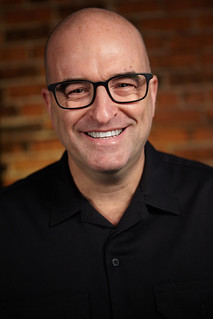
PREV ARTICLE
NEXT ARTICLE
FULL ISSUE
PREV FULL ISSUE
ERIC SCHENA INTERVIEW, PART THREEGreg Bennick also interviewed exonumia researcher and collector Eric Schena. Here's the third part, where Eric talks about the development of local scrip, why most issues are very rare, and why so many varieties were issued in West Virginia. -Editor GREG BENNICK: I love it. This is why when we met, I knew we were kindred spirits, even if you're collecting things I don't necessarily collect. I've had a growing interest in counterstamps over the last year. In collecting counterstamps, you'll find a merchant who issued some counterstamps and that name was stamped by that merchant on that exact coin. And then you find ancillary things relating to that counterstamp. Maybe it's a photo, if it's a photographer or a piece of silver, if it's a silversmith, and then you learn about maybe who owned that or whose photo was taken by the photographer who stamped the counterstamp coin. And this is hours of entertainment and legacy building and you know like you said, stewardship of history.
So, that kind of thing disappears in time. Because a lot of people just don't think much of it. It's just part of daily life. Going to, if you live in a coal camp, going to the company store to go buy a bucket of coal for your furnace or mining equipment or a five-pound bag of flour. Because you had to buy all of that at the company store. It was just way of life. That's what you did. And then when the towns closed up shop, that just vanished from memory. And in coal camps, that's a risk. That did happen. There's a story. It's actually an article that I wrote on this town. It's a place called Kempton. And it's in Maryland. But it straddles the line with West Virginia. If you ever look at a map of Maryland, it's in the very point in Garrett County. And it's between Garrett and Preston County. And the mine, the tipple, the school, the houses, all of that equipment was in Maryland. 25 feet over the state line was where the company store, the post office, and the corporate headquarters were. And the reason why they did that was because in the 1860s, the state of Maryland banned company stores. And they didn't want to have anything to do that. They didn't, do with that. Get around that. This particular mining company, it was the Davis Coal and Coke Company, moved all their, made sure that their offices and the post office was in West Virginia. And the tokens actually say Kempton, West Virginia. If you look on Google Maps, it'll probably say Kempton, Maryland. Because that's where the majority of it is. And in fact, the store building doesn't exist anymore. It's an ankle bone site. It's mostly a foundation course. And what's really interesting about this is in the 1950s, that coal played out. The coal seam ran out. And Davis Coal and Coke decided all of a sudden to just close up shop. And that's exactly what they did. They closed up their office, sealed up the mine. And they sent out a notice saying you had two weeks to redeem all your scrip and to vacate. And that's exactly what they did. And they grabbed all the scrip that they could pay out. They redeemed it all. And they dumped it down a mine shaft and filled the mine shaft with tailings. So, there's a pile of scrip somewhere in Western Maryland, down a very deep hole with a lot of overburden on top of it. And so that's what happened to an awful lot of that scrip. And there's some still around, obviously. I mean, I know about it. There are mining records. There are still minting records from Ingle Schierloh that still have the records and all that. But otherwise, that's what would happen to the stuff. It was considered just an ersatz currency, almost like a gift certificate. And so, it wasn't preserved. And whatever is around now just happened to escape being dumped into that pit. GREG BENNICK: It's so interesting because I was in New York City last week. And many people, you don't have to be 100 years old to remember when there were tokens years ago to ride the subway. And you certainly don't need to be even 50 years old to remember when there were people in the booths that you would purchase access to the subway from. Or who would answer questions for you. And now, of course, everything is automated. Pay with your credit card. You don't even need to pay with your credit card. Scan your phone. Enter the subway. So, what's interesting to me about this and what you're talking about is that the experience of being in New York City and Manhattan and riding the subway is entirely different because of the way we pay. And the experience of being in the coal town back then was entirely different than it could possibly be today, because of the way people paid for and purchased items. ERIC SCHENA: Exactly. GREG BENNICK: Yeah! The scrip or the token became part of the life experience overall that isn't replicated today in any way, shape, or form, potentially. ERIC SCHENA: Yep, exactly right. People don't realize that prior to the Eisenhower interstate system, it was difficult getting from one major town to another every once in a while. If not, everyone had cars, and certainly in 1910, 1920, not everyone did, certainly in the rural areas, it was an effort to go 15, 20 miles. Especially if you're in the mines. Because a lot of those mines are in very rural areas, very out-of-the-way areas, difficult to access. And if you are out in those places, getting money there is equally hard as getting tomatoes or whatever. So, a lot of places had to make do. And a lot of those companies, the mining companies, would issue their own money for especially that purpose. There was a side benefit for the mine owners in that they could charge, they could upcharge, their basically captive audience. GREG BENNICK: You don't have any other alternative, right? ERIC SCHENA: Yeah, that's exactly right. And if you only have the one store in town, you have no choice than to pay their prices. And the way store scrip really evolved back then is it became, in a way, almost like a payday advance. A lot of times, the prices were very high. The families didn't have enough money to buy all the stuff that they needed. So, the miner would have to take an advance on their pay, and they would take that advance in the form of scrip. And so, it all goes back to the company store. That's why Tennessee Ernie Ford sang that song. You know, 16 tons and... GREG BENNICK: "…what do you get? Another day older and deeper in debt." ERIC SCHENA: Exactly. "I sold my soul to the company store." Exactly. GREG BENNICK: That's right. ERIC SCHENA: That's exactly what that was written about. And some companies were better than others. But there was always some form of that there. And what's really fascinating is there's a lot of other states started catching on and cracking down on it. Coal company scrip is throughout the United States. And there's coal company scrip from Alabama, quite a bit from Alabama. There's even some from New Mexico, Colorado. You name it, there's coal company scrip. But there's one state that stands above all others, and that's West Virginia. And the standard catalog for coal company scrip is in two volumes. Volume one is every state except West Virginia. Volume two is just West Virginia. There are thousands upon thousands upon thousands of different types of coal scrip from West Virginia alone. And that's because the laws of West Virginia were very lax when it came to issuing that kind of stuff. Maryland? It's two or three pages, and that's about it. And some of that had to be a little sneaky. It wouldn't expressly say Davis Coal and Coke Company. It would have another name. In that particular case, it was Buxton and Landstreet. They had, it was, on paper, a separate entity, but in reality, owned by the same company. And so that kind of nefariousness existed back then. GREG BENNICK: So, tell me this, just before I forget. Is that a Dave Schenkman book? Did he write that book, or did somebody else write that book? ERIC SCHENA: No, that was Edkins. GREG BENNICK: Okay. And I ask about Dave Schenkman, who is obviously a mutual friend of both of us, because he's known prolific in the way that Dave Bowers has been prolific. It's like if I hear of a book about some aspect of numismatics that I don't know about, Dave Bowers or Dave Schenkman probably wrote the books. ERIC SCHENA: Yes. Dave Schenkman is, as far as I'm concerned, a national treasure. When it comes to numismatics. I've been fortunate, I would almost say blessed, to have known him for as long as I have. He has taught me so much. He continues to teach me so much. And he has given so much to the numismatics community that I don't think enough good things can be said about the man. GREG BENNICK: I agree. Even just being at Token and Medal Society banquets or around people-related Token and Medal Society, he walks in the room, and it's like one of the members of Metallica just walked into the room. ERIC SCHENA: Yeah, basically. GREG BENNICK: He's a rock star. The guy's a rock star. ERIC SCHENA: Yeah, he is a rock star. And he doesn't like to think of himself as that, but he is. And, well, it's earned. GREG BENNICK: All of this is fascinating. I feel like we could do an entire interview just on West Virginia coal scrip. ERIC SCHENA: Oh, absolutely.
To watch the complete video, see:
To read the complete transcript, see:
To read the earlier E-Sylum article, see:
Wayne Homren, Editor The Numismatic Bibliomania Society is a non-profit organization promoting numismatic literature. See our web site at coinbooks.org. To submit items for publication in The E-Sylum, write to the Editor at this address: whomren@gmail.com To subscribe go to: https://my.binhost.com/lists/listinfo/esylum All Rights Reserved. NBS Home Page Contact the NBS webmaster 
|


